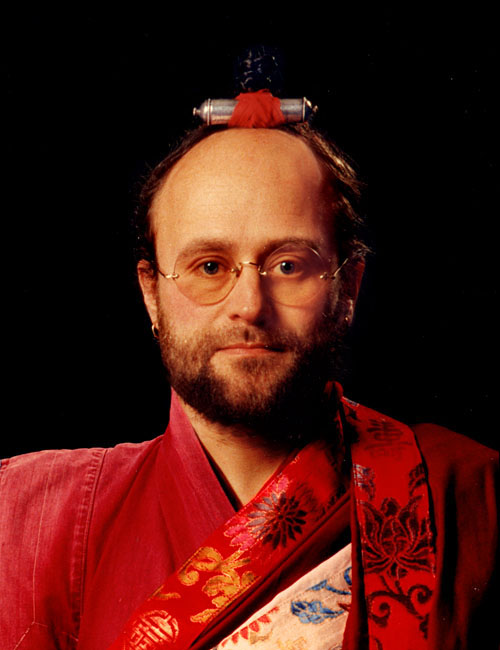
Ngak’chang Rinpoche
teaching on yeshé ’cholwa
This portrait of Ngak’chang Rinpoche was taken in Shaftsbury, Dorset in 1990-1991. Ngak’chang Rinpoche is wearing his formal empowerment shawl. He is wearing the takdröl, a yogi’s hair ornament, given to him by Lama Yeshé Dorje Rinpoche in McLeod Ganj in 1981. Chhi’mèd Rig’dzin Rinpoche said that after his passing, Ngak’chang Rinpoche would manifest Wisdom-chaos.
When questioned concerning this statement, Ngak’chang Rinpoche said:
Chhi’mèd Rig’dzin Rinpoche was giving
encouragement to apprentices rather than pointing out anything special
about me. The inner meaning of this statement alludes to the fact that without
proper supervision I would probably act in a ridiculous manner.
On another occasion Ngak’chang Rinpoche was asked about the phenomenon of Wisdom-chaos in the context of Dorje Tröllö, and this was his response: ‘Wisdom-chaos in Tibetan is yeshé ’cholwa (ye shes ‘chol ba). Yeshé means primordial wisdom. Yé means primordial. Shé means knowing. So yeshé means primordial knowing – that is, knowing which has not been created. The word ‘shérab’ means knowledge – knowledge which comes from experience, knowledge which emerges in parts. Yeshé, however, does not emerge in parts; she arises from primordial rigpa. This is also called ye-rig. ‘Cholwa means wildness – so yeshé ’cholwa means ‘wisdom gone wild’ but it also signifies non-dual discourtesy and non-dual abruptness.
Wisdom-chaos is misunderstood, particularly by a variety of
Western Buddhist teachers. You cannot ‘discover your own Wisdom-chaos by
offering lollipops to strangers’. You cannot ‘discover your own Wisdom-chaos by
meowing for no apparent reason’. These are both quotes from a book. That is both
banal and ridiculous. I should have prefaced this by saying that
Chhi’mèd Rig’dzin Rinpoche once described me as
‘one big diplomat’. He was not being polite when he said this. I do not think
this is a good way to be; it is just how I am, and I cannot help it sometimes.
Being ‘one big diplomat’ means that, in terms of teaching, one engages with the
dualistic condition. If one is conversing with the dualistic state, one tries
not to upset the dualistic state. One flatters the dualistic state. One is kind
to the dualistic state, in order to introduce the idea that at some point one
might have to murder the dualistic state. It is going to take a while, however,
and one wishes to assure the dualistic state that it is not really going to die.
This is being ‘one big diplomat’. It is also being fairly treacherous – but it
is diplomatic. Yeshé ’cholwa has no truck with diplomacy. Yeshé ’cholwa is
discourteous to duality. Yeshé ’cholwa uses expletives when it converses with
samsara. Yeshé ’cholwa employs coarse and derisorily contemptuous language.
Yeshé ’cholwa throws ad hominem abuse at samsara. This is why it is called
wisdom-gone-wild or ‘Wisdom-chaos’, because non-duality looks chaotic from the
point of view of duality. Duality thinks that Lamas should respect duality – and
be polite, courteous, democratic, wholesome, biodegradable, and everything good.
But yeshé ’cholwa does not deliver courtesy. Yeshé ’cholwa delivers vulgarity,
discourtesy, and dismissiveness. Yeshé ’cholwa does not play along with duality;
it gives duality no room; it barges in front of duality at the bus-stop so that
duality misses the bus and falls in the gutter.
If we practise
Dorje Tröllö we have to
become Dorje Tröllö – and to be Dorje Tröllö is to have complete discourtesy for
our own dualistic state. That is the craziness of Wisdom-chaos. To be Dorje
Tröllö is to open a big can of whupp-ass in respect of our tendencies to edit
drüpthab – either as the words we find in liturgical drüpthabs, or in the
semantic structure of the Lama’s drüpthab of speech. We have to contact that
sparkling through of the enlightened
state. We have to contact the radiant discourtesy of the vajra-vulgarian Dorje
Tröllö, whose radiant rudeness, radiant insolence, radiant contempt, radiant
scorn, radiant derision, radiant disdain is all-consuming. Yeshé ’cholwa
dismisses the dualistic state out-of-hand. Yeshé ’cholwa gives it no quarter.
Yeshé ’cholwa makes no excuses for duality, Yeshé ’cholwa doesn’t give it
another five minutes; it doesn’t supply it with a repeater alarm. There is
something entirely blunt about this.
